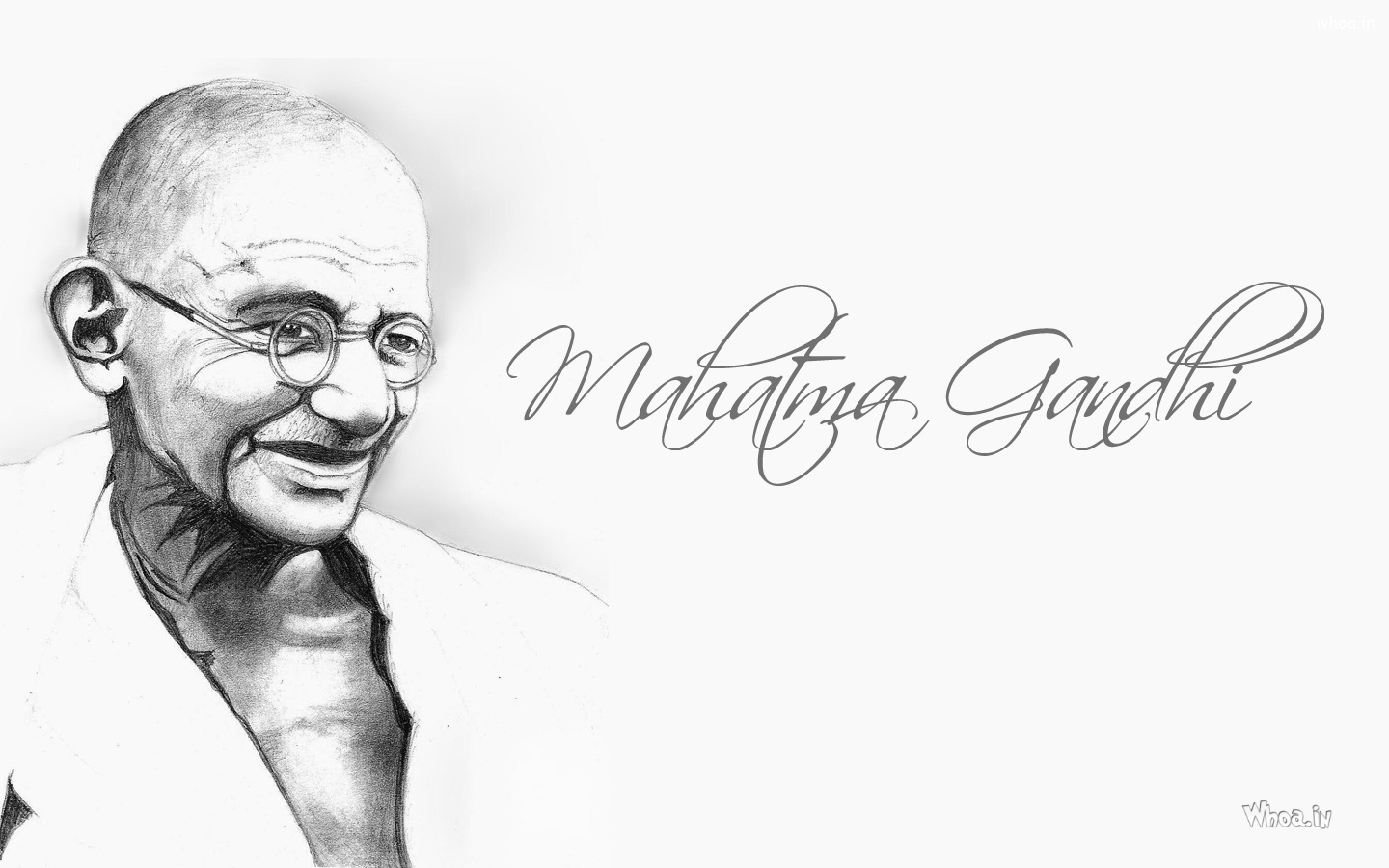- Mahatma Gandhi -
The most notable man of nonviolent philosophy and passive resistance.

- Some of the most relevant aspects during his life:
- 1869 - Mohandas Karamchand Gandhi was born on October 2, 1869, at Porbandar, in the present-day Indian state of Gujarat. Gandhi grew up worshiping the Hindu god Vishnu and following Jainism, a morally rigorous ancient Indian religion that espoused non-violence, fasting, meditation and vegetarianism.
- 1883 - In May 1883, the 13-year-old Mohandas was married to 14-year-old Kasturbai Makhanji Kapadia (her first name was usually shortened to "Kasturba", and affectionately to "Ba") in an arranged marriage, according to the custom of the region at that time.
- 1885 - In late 1885, Gandhi's father Karamchand died Gandhi, then 16 years old, and his wife of age 17 had their first baby, who survived only a few days. The two deaths anguished Gandhi. The Gandhi couple had four more children, all sons: Harilal, born in 1888; Manilal, born in 1892; Ramdas, born in 1897; and Devdas, born in 1900.
- 1888 - In 1888, 18-year-old Gandhi sailed for London, England, to study law. The young Indian struggled with the transition to Western culture. Although Gandhi was interested in becoming a doctor, his father hoped he would also become a government minister and steered him to enter the legal profession.
- 1891 - Upon returning to India in 1891, Gandhi learned that his mother had died just weeks earlier. He struggled to gain his footing as a lawyer.
- 1893 - After struggling to find work as a lawyer in India, Gandhi obtained a one-year contract to perform legal services in South Africa. In April 1893, he sailed for Durban in the South African state of Natal.
- 1906 - Gandhi organized his first mass civil-disobedience campaign, which he called “Satyagraha” (“truth and firmness”), in reaction to the South African Transvaal government’s new restrictions on the rights of Indians, including the refusal to recognize Hindu marriages.
- 1913 - After years of protests, the government imprisoned hundreds of Indians in 1913, including Gandhi. Under pressure, the South African government accepted a compromise negotiated by Gandhi and General Jan Christian Smuts that included recognition of Hindu marriages and the abolition of a poll tax for Indians.
- 1914 - Gandhi sailed from South Africa in 1914 to return home. At the outbreak of World War I, Gandhi spent several months in London.
- 1915 - Gandhi founded an ashram in Ahmedabad, India, that was open to all castes. Wearing a simple loincloth and shawl, Gandhi lived an austere life devoted to prayer, fasting and meditation. He became known as “Mahatma,” which means “great soul.”
- 1919 - Gandhi launched an organized campaign of passive resistance in response to Parliament’s passage of the Rowlatt Acts, which gave colonial authorities emergency powers to suppress subversive activities.
- 1922 - After British authorities arrested Gandhi, he pleaded guilty to three counts of sedition. Although sentenced to a six-year imprisonment, Gandhi was released in February 1924 after appendicitis surgery.
- 1930 - Gandhi returned to active politics to protest Britain’s Salt Acts, which not only prohibited Indians from collecting or selling salt—a dietary staple—but imposed a heavy tax that hit the country’s poorest particularly hard.
- 1934 - After his eventual release, Gandhi left the Indian National Congress in 1934, and leadership passed to his protégé Jawaharlal Nehru. He again stepped away from politics to focus on education, poverty and the problems afflicting India’s rural areas.
- 1942 - Gandhi launched the “Quit India” movement that called for the immediate British withdrawal from the country. In August 1942, the British arrested Gandhi, his wife and other leaders of the Indian National Congress and detained them in the Aga Khan Palace in present-day Pune.
- 1944 - With his health failing, Gandhi was released after a 19-month detainment in.
- 1948 - On January 30, 1948, 78-year-old Gandhi was shot and killed by Hindu extremist Nathuram Godse, who was upset at Gandhi’s tolerance of Muslims. Godse and a co-conspirator were executed by hanging in November 1949. Additional conspirators were sentenced to life in prison.
"Live as if you were to die tomorrow. Learn as if you were to live forever."
-- Mahatma Gandhi